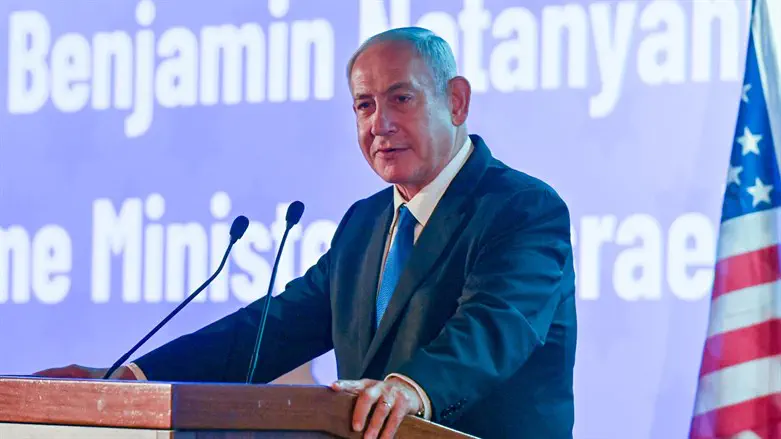
Prime Minister Benjamin Netanyahu, today (Wednesday), addressed the virtual US State Department Summit for Democracy 2023, which was initiated by US President Joe Biden. Prime Minister Netanyahu participated in the first session, hosted by the Republic of Korea President Yoon Suk Yeol, on the subject of "Democracy Delivering Economic Growth and Shared Prosperity."
The following are Prime Minister Netanyahu's remarks at the Summit:
"I want to thank the world leaders and President Biden, who's been a friend of 40 years, for convening this important conference. You know, Israel and the United States have had their occasional differences, but I want to assure you that the alliance between the world's greatest democracy and a strong, proud and independent democracy – Israel – in the heart of the Middle East is unshakable. Nothing can change that. We have worked together, Israel and the United States, to achieve the historic Abraham Accords that made peace between Israel and four Arab states. We are now working together to expand these peace accords further, and they obviously bring increased prosperity to our peoples.
The topic of this forum is 'Democracy and Shared Prosperity.' Now, in my long tenure as prime minister, I've had the opportunity – and as foreign minister – I've had the opportunity to address both issues. Twenty years ago, I led a free market revolution in Israel. Israel was a semi-socialist economy – highly regulated, highly controlled, highly taxed – with very low participation in the workforce, with monopolies, including government monopolies abounding throughout our economy. I proposed changes – radical changes to correct this. This was met with massive protests, with months and months of national labor strikes, with admonitions that this would wreck the Israeli economy, that it would make the rich grow richer and the poor grow poorer. But we persisted. And the results have been very clear.
After these reforms, Israel grew at four to five percent annual growth rate of GDP for two decades. We went from $17,000 GDP per capita to $54,000 GDP per capita according to the IMF. Unemployment went down. Participation in the workforce went up in all sectors dramatically. The Israeli economy has become a player on the global scene, allowing for innovation, enterprise and, of course, participation with many, many other economies and many, many other companies in many countries.
I'm saying this because it's not only that the economy grew and prosperity increased, but shared prosperity increased, because contrary to the predictions that the rich will grow richer and the poor will grow poorer, everybody grew richer. And in fact, the Gini Coefficient that marks inequality went down to its lowest point in 20 years. We achieved prosperity and shared prosperity.
Now, twenty years later, we're engaged in a second public debate. You may have noted Israel is undergoing, in its robust democracy, a very intensive public debate. And the debate is how do we ensure a proper democracy. Democracy means the will of the people as expressed by a majority, and it also means protection of civil rights, individual rights. It's the balance between the two.
Now, half our people are convinced that the will of the majority, as expressed in the legislative and executive branch has been, in many ways, obstructed by an all-powerful judiciary that dominates them, that doesn't let the public will be expressed. The other half of the people are concerned that maybe, even if this is true, but if any curtailment of judiciary powers is enacted, this would somehow impair and obstruct civil liberties.
I think both considerations have to be taken into account. I think both of them are valid, both of them are true, and we have to make sure that as we shift the pendulum from one side of an ever-powerful judiciary – which is different from an independent judiciary – how do we ensure that the judiciary remains independent and that we balance the need to strengthen the executive and the legislative, and at the same time protect individual rights.
I think that balance can be achieved. And that's why I've promoted a pause that now enables both the opposition and the coalition to sit down and try to achieve a broad national consensus to achieve both goals. And I believe this is possible. We're now engaged in exactly this conversation.
Several governments have expressed their concern, so I want to assure you now of two things. The first is that we have, I think, in the midst of this very robust debate, I think we have a historic opportunity – a historic opportunity to strengthen democracy, to restore a proper balance between the three branches of government, because that's what protects majority rights and individual rights. And at the same time, also to enshrine civil rights with an agreed national consensus.
I think this is something that is an opportunity that Israel has waited for. These things are always dramatic. They're always engaged in public and often painful discourse. But we have to move from protest to agreement. And that's where I want to get. The right to protest is sacrosanct, but I think the obligation for national leaders is to try to take these issues in contention and merge them into a happy center.
The second thing that I want to assure you is that Israel was, is and it will always remain a proud, strong and vibrant democracy, as a beacon of liberty and shared prosperity in the heart of the Middle East."
